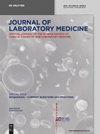潜能不确定的克隆性造血:液体分析中偶然发现的临床相关性
IF 1.8
4区 医学
Q4 MEDICAL LABORATORY TECHNOLOGY
引用次数: 1
摘要
摘要不确定潜能克隆性造血(CHIP)是一种血液学前体病变,其定义为外周血细胞中存在体细胞突变,但没有证据表明存在白血病或其他血液肿瘤。CHIP在老年人中很常见,可以在无细胞DNA的液体分析中偶然发现。虽然液体图谱分析旨在减少CHIP产生的生物噪声,并将固体癌相关突变图谱与CHIP相关突变图谱区分开来,但CHIP的发现本身具有潜在的临床相关性。总的来说,CHIP与每年1%的中度进展为显性血液系统肿瘤的风险相关。不明原因的血细胞计数异常、多个突变或特定突变模式的患者的风险显著增加。在患有实体癌症的患者中,CHIP的存在增加了与治疗相关的髓系肿瘤的发展风险。此外,CHIP与许多非血液系统疾病有关,是以前未被认识的心血管疾病的主要危险因素。诊断为CHIP的个体的管理包括在多学科环境中进行血液学和心血管风险评估。需要来自介入研究的额外证据将CHIP整合到实体癌症患者的个性化治疗方法中。本文章由计算机程序翻译,如有差异,请以英文原文为准。
Clonal hematopoiesis of indeterminate potential: clinical relevance of an incidental finding in liquid profiling
Abstract Clonal hematopoiesis of indeterminate potential (CHIP) is a hematologic precursor lesion that is defined by the presence of somatic mutations in peripheral blood cells but without evidence for the presence of leukemia or another hematologic neoplasm. CHIP is frequent in elderly individuals and can be detected as incidental finding in liquid profiling of cell-free DNA. While liquid profiling assays aim to reduce the biological noise generated by CHIP and to discriminate solid cancer-associated from CHIP-associated mutation profiles, the finding of CHIP is of potential clinical relevance at its own. Overall, CHIP is associated with a moderate risk of progression to an overt hematologic neoplasm of 1% per year. The risk increases substantially in patients with unexplained blood count abnormalities, multiple mutations, or specific patterns of mutations. In patients with solid cancer, the presence of CHIP increases the risk for development of treatment-related myeloid neoplasms. In addition, CHIP has been associated with a number of non-hematological diseases and represents a previously unrecognized major risk factor for cardiovascular disease. The management of individuals diagnosed with CHIP includes both hematologic and cardiovascular risk assessment in a multidisciplinary setting. Additional evidence from interventional studies is needed to integrate CHIP into a personalized treatment approach for patients with solid cancer.
求助全文
通过发布文献求助,成功后即可免费获取论文全文。
去求助
来源期刊

Journal of Laboratory Medicine
Mathematics-Discrete Mathematics and Combinatorics
CiteScore
2.50
自引率
0.00%
发文量
39
审稿时长
10 weeks
期刊介绍:
The Journal of Laboratory Medicine (JLM) is a bi-monthly published journal that reports on the latest developments in laboratory medicine. Particular focus is placed on the diagnostic aspects of the clinical laboratory, although technical, regulatory, and educational topics are equally covered. The Journal specializes in the publication of high-standard, competent and timely review articles on clinical, methodological and pathogenic aspects of modern laboratory diagnostics. These reviews are critically reviewed by expert reviewers and JLM’s Associate Editors who are specialists in the various subdisciplines of laboratory medicine. In addition, JLM publishes original research articles, case reports, point/counterpoint articles and letters to the editor, all of which are peer reviewed by at least two experts in the field.
 求助内容:
求助内容: 应助结果提醒方式:
应助结果提醒方式:


